* * *
Please support I. U.
PayPal: Donate in USD
PayPal: Donate in EUR
PayPal: Donate in GBP
The man who trades freedom for security does not deserve nor will he ever receive either. – Benjamin Franklin
It is common these days, when Western nations are discussing the government of Ethiopia, to hear a raft of attacks on that nation for “human rights violations.” But is that a true picture? The most fundamental human right is the right to live. Like China, which has lifted 500 million of its citizens out of poverty over the last three decades, Ethiopia has reduced the number of people living in poverty by one third over the last decade, from 38.7% of the population in 2004 to 26% in 2014. In tandem, according to the CIA’s World Factbook, the crude death rate has declined by over 50%, and life expectancy has jumped from 40.88 to 60.75 years.
…
* * *
PayPal: Donate in USD
PayPal: Donate in EUR
PayPal: Donate in GBP
When searching for solutions to produce distilled water without electricity I came along a lot simple, incredibly cheap, efficient, stunning and award-winning inventions, but all of them (seem to) have never been implemented to help the people.
Why?
Because distilled water is one of the secrets to a long & healthy life and it boosts brain power and that is exactly the opposite what the elitists want, because the elitists want us to be dumb, lethargic and sterile serfs.
Actually they want most of us to be dead.
The plan is to get rid of about 6 billion people.
That’s why.
On philanthropist Bill Gates:
– Bill Gates Funds Technology To Cause Instant Male Infertility
– Bill Gates In Global Push To Vaccinate Every Child On The Planet
– Bill Gates Admits Vaccines Are For Depopulation
Philanthropists like Bill Gates are not wrong, just evil!
Designer Arturo Vittori says his invention can provide remote villages with more than 25 gallons of clean drinking water per day
In some parts of Ethiopia, finding potable water is a six-hour journey.
People in the region spend 40 billion hours a year trying to find and collect water, says a group called the Water Project. And even when they find it, the water is often not safe, collected from ponds or lakes teeming with infectious bacteria, contaminated with animal waste or other harmful substances.
The water scarcity issue—which affects nearly 1 billion people in Africa alone—has drawn the attention of big-name philanthropists like actor and Water.org co-founder Matt Damon and Microsoft co-founder Bill Gates, who, through their respective nonprofits, have poured millions of dollars into research and solutions, coming up with things like a system that converts toilet water to drinking water and a “Re-invent the Toilet Challenge,” among others.
Flashback:
– ENSSER: 297 Scientists And Experts Agree GMOs Not Proven Safe:
*EU chief scientist Anne Glover’s backing for GM condemned as “irresponsible”
– Tory MP Zac Goldsmith: Pro-GMO Environment Secretary Owen Paterson Is ‘Industry Puppet’
– Paterson and Glover push GMOs in Africa at taxpayers’ expense (GM Watch, Feb 12, 2014):
On 25-26 February the UK environment secretary Owen Paterson and the EU’s chief lobbyist (sorry, scientist) Anne Glover will promote GMOs at a workshop in Addis Ababa, Ethiopia.
Also speaking will be a large number of well known GM evangelists from Europe, such as Matin Qaim and Joachim Schiemann.
– Ethiopian kids hack OLPCs in 5 months with zero instruction (DVICE, Oct 30, 2012):
What happens if you give a thousand Motorola Zoom tablet PCs to Ethiopian kids who have never even seen a printed word? Within five months, they’ll start teaching themselves English while circumventing the security on your OS to customize settings and activate disabled hardware. Whoa.
The One Laptop Per Child project started as a way of delivering technology and resources to schools in countries with little or no education infrastructure, using inexpensive computers to improve traditional curricula. What the OLPC Project has realized over the last five or six years, though, is that teaching kids stuff is really not that valuable. Yes, knowing all your state capitols how to spell “neighborhood” properly and whatnot isn’t a bad thing, but memorizing facts and procedures isn’t going to inspire kids to go out and learn by teaching themselves, which is the key to a good education. Instead, OLPC is trying to figure out a way to teach kids to learn, which is what this experiment is all about.
Read moreEthiopian Kids Hack Laptops In 5 Months With Zero Instruction
– Worst drought in 60 years hitting Horn of Africa: U.N. (Reuters, June 28, 2011)
GENEVA (Reuters) – The worst drought in 60 years in the Horn of Africa has sparked a severe food crisis and high malnutrition rates, with parts of Kenya and Somalia experiencing pre-famine conditions, the United Nations said on Tuesday.
More than 10 million people are now affected in drought-stricken areas of Djibouti, Ethiopia, Kenya, Somalia and Uganda and the situation is deteriorating, it said.
“Two consecutive poor rainy seasons have resulted in one of the driest years since 1950/51 in many pastoral zones,” Elisabeth Byrs, spokeswoman of the U.N. Office for the Coordination of Humanitarian Affairs, told a media briefing.
“There is no likelihood of improvement (in the situation)until 2012,” she said.
Food prices have risen substantially in the region, pushing many moderately poor households over the edge, she said.
See also:
– How Goldman Sachs Created the Food Crisis
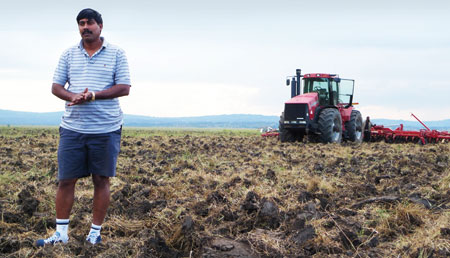
“This is green gold,” says Sai Karuturi, CEO of Karuturi Global, on a visit to his 300,000 ha farmland concession in Gambela Province, Ethiopia.
ARTE | 3 May 2011
Directed by Alexis Marant
Produced by CAPA PRESSE TV
Distributed by ARTE
Read morePlanet for Sale – The New World Agricultural Order (Documentary)
Highly recommended article.
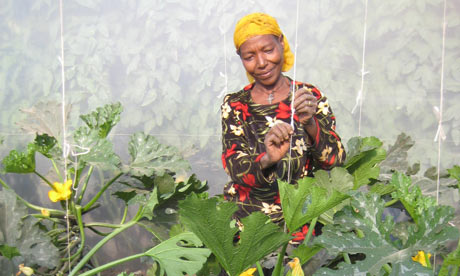
A woman tends vegetables at a giant Saudi-financed farm in Ethiopia.
We turned off the main road to Awassa, talked our way past security guards and drove a mile across empty land before we found what will soon be Ethiopia’s largest greenhouse. Nestling below an escarpment of the Rift Valley, the development is far from finished, but the plastic and steel structure already stretches over 20 hectares – the size of 20 football pitches.
The farm manager shows us millions of tomatoes, peppers and other vegetables being grown in 500m rows in computer controlled conditions. Spanish engineers are building the steel structure, Dutch technology minimises water use from two bore-holes and 1,000 women pick and pack 50 tonnes of food a day. Within 24 hours, it has been driven 200 miles to Addis Ababa and flown 1,000 miles to the shops and restaurants of Dubai, Jeddah and elsewhere in the Middle East.
Ethiopia is one of the hungriest countries in the world with more than 13 million people needing food aid, but paradoxically the government is offering at least 3m hectares of its most fertile land to rich countries and some of the world’s most wealthy individuals to export food for their own populations.
The 1,000 hectares of land which contain the Awassa greenhouses are leased for 99 years to a Saudi billionaire businessman, Ethiopian-born Sheikh Mohammed al-Amoudi, one of the 50 richest men in the world. His Saudi Star company plans to spend up to $2bn acquiring and developing 500,000 hectares of land in Ethiopia in the next few years. So far, it has bought four farms and is already growing wheat, rice, vegetables and flowers for the Saudi market. It expects eventually to employ more than 10,000 people.
But Ethiopia is only one of 20 or more African countries where land is being bought or leased for intensive agriculture on an immense scale in what may be the greatest change of ownership since the colonial era.
An Observer investigation estimates that up to 50m hectares of land – an area more than double the size of the UK – has been acquired in the last few years or is in the process of being negotiated by governments and wealthy investors working with state subsidies. The data used was collected by Grain, the International Institute for Environment and Development, the International Land Coalition, ActionAid and other non-governmental groups.
The land rush, which is still accelerating, has been triggered by the worldwide food shortages which followed the sharp oil price rises in 2008, growing water shortages and the European Union’s insistence that 10% of all transport fuel must come from plant-based biofuels by 2015.
Read moreThe 21st-century African land grab by rich countries facing global food and water shortages
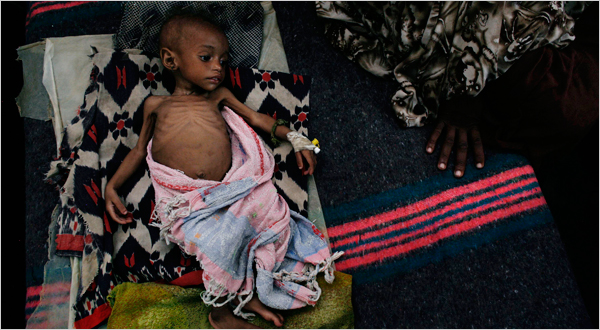
Above, a severely malnourished baby lay unresponsive on Thursday as the mother and father sat nearby in a feeding center in Afgooye, Somalia.
AFGOOYE, Somalia – Just step into a feeding center here, and the sense of hopelessness is overwhelming.
Dozens of women sit with listless babies in their laps, snapping their fingers, trying to get a flicker of life out of their dying children.
Little eyes close. Wizened 1-year-olds struggle to breathe. This is the place where help is supposed to be on its way. But the nurses in the filthy smocks are besieged. From the doorway, you can see the future of Somalia fading away.
While the audacity of a band of Somali pirates who hijacked a ship full of weapons has grabbed the world’s attention, it is the slow-burn suffering of millions of Somalis that seems to go almost unnoticed.
The suffering is not new. Or especially surprising. This country on the edge of Africa has been slowly, but inexorably, sliding toward an abyss for the past year and a half – or, some would argue, for the past 17. United Nations officials have called Somalia “the forgotten crisis.”
Read moreWith Spotlight on Pirates, Somalis on Land Waste Away in the Shadows
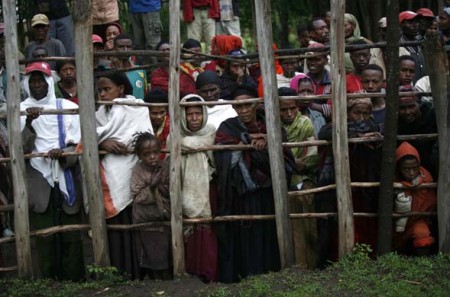
More than 14 million people in the east Africa region require urgent food aid due to drought and spiralling cereal and fuel prices, aid agencies say.
In an emergency appeal launched today, Oxfam warns that millions of people in Ethiopia, Somalia, Uganda, Djibouti and Kenya are fast being pushed “towards severe hunger and destitution”. Earlier this week the UN said it needed £200m to avert a humanitarian disaster.
The hunger crisis is worse than the last regional emergency in 2006, when drought caused 11 million people to need assistance, because of the added impact of the global food price increases. Poor families are struggling to buy staples such as maize and wheat, which have more than doubled in price over the past 12 months.
__________________________________________________________________________________
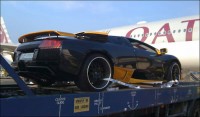
His black-and-gold supercar costs £3,552 to service at an approved dealer – on top of the £20,000 to freight from Qatar to Britain. Source: Sun
___________________________________________________________________________________
“In previous droughts most people on the margins found ways to cope,” said Peter Smerdon, of the World Food Programme. “But the simultaneous increase in food prices this time around means they are cutting down on meals and taking their kids out of school in order to try to get by. More people are falling over the edge.”
The British and US governments are complicit in war crimes and crimes against humanity committed by the Ethiopian army in the Ogaden region of the Horn of Africa, a human rights group has claimed.
A report by Human Rights Watch details allegations of rape, torture and public execution carried out by Ethiopian soldiers against civilians in the predominantly Somali Ogaden area, where Ethiopia is fighting a fierce counter-insurgency campaign. The battles intensified last year after an attack by rebels of the Ogaden National Liberation Front (ONLF) on a Chinese-run oil plant in the town of Obole. The ONLF killed more than 70 civilians, including nine Chinese.
In response, Ethiopia stepped up its military crackdown in the eastern province, referred to by some ethnic Somali Muslims as Western Somalia. Witnesses say Ethiopian forces have burnt dozens of villages to the ground – a claim apparently confirmed by satellite images released by the American Association for the Advancement of Science.
According to Human Rights Watch, people accused of aiding the ONLF have executed, often in public, while hundreds more have been detained in military barracks and tortured.
“The Ethiopian army’s response to the rebels has been to viciously attack civilians in Ogaden,” said the group’s spokeswoman, Georgette Gagnon. “These atrocities amount to war crimes and crimes against humanity.”
Ethiopia’s Prime Minister, Meles Zenawi, was once held up as a poster boy for African governance, taking a prominent role in Tony Blair’s Commission for Africa. But since 2005, he has claimed victory in a flawed election and clamped down on political opposition. Up to 200 people protesting against the result were killed by security forces and 100 were charged with treason.
Despite claims of authoritarianism and war crimes in both Ogaden and neighbouring Somalia, British aid for Ethiopia has more than doubled since 2005 to £130m. The US has also increased its support for the army, which it sees as a strong regional ally in the “war on terror”.
Read moreBritain and US ‘complicit in war crimes by Ethiopian military’
Fidencio Alvarez abandoned his bean and corn farm in southern Honduras because of the rising cost of seeds, fuel and food. After months of one meal a day, he hiked with his wife and six children to find work in the city.
“We would wake up with empty stomachs and go to bed with empty stomachs,” said Alvarez, 37, who sought help from the Mission Lazarus aid group in Choluteca in January. “We couldn’t afford the seeds to plant food or the bus fare to buy the food.”
Honduran farmers like Alvarez can’t compete in a global marketplace where the costs of fuel and fertilizer soared and rice prices doubled in the past year. The former breadbasket of Central America now imports 83 percent of the rice it consumes — a dependency triggered almost two decades ago when it adopted free-market policies pushed by the World Bank and other lenders.
The country was $3.6 billion in debt in 1990. In return for loans from the World Bank, Honduras became one of dozens of developing nations that abandoned policies designed to protect farmers and citizens from volatile food prices. The U.S. House Financial Services Committee in Washington today explored the causes of the global food crisis and possible solutions.
The committee examined whether policies advocated by the bank and the International Monetary Fund contributed to the situation. Governments from Ghana to the Philippines were pressured to cut protective tariffs and farm supports and to grow more high-value crops for export, reports by the Washington-based World Bank show.
Haiti Pressure
The IMF pressed Haiti, as a condition of a 1994 loan, to open its economy to trade, Raj Patel, a scholar at the Center for African Studies in the University of California at Berkeley told the committee. When trade barriers fell, imports of subsidized rice from the U.S. surged, devastating the local rice farmers, Patel said.
“That is very odd,” said committee chair Barney Frank, a Massachusetts Democrat. “For anyone to have looked at Haiti at that time and thought that it was a functioning economy is a sign I think of ideology going rampant.”
“Of course they got it wrong,” said Robert S. Zeigler, director-general at the International Rice Research Institute, southeast of Manila. “It will work if you’re an extremely wealthy country and you can import rice at any price. But if you’re not an extremely wealthy country, I think that’s very poor advice.”
Do you really think that anyone who’s ever made a loan or grant to any dictator, anywhere in the world, has any doubt about what is going to happen with the money?
Sure, Bono is an idiot, people will say. Woops. Silly Bono.
While there are lots of idiots in the world, not many of them just happen to be A) responsible for genocide, directly, indirectly or otherwise and B) an honorary Knight Commander of the Most Excellent Order of the British Empire.
It’s all a coincidence, of course. As usual.
Via: New Zealand Herald:
Billions of dollars raised for African famine relief by celebrities Bono and Bob Geldof have instead funded civil war across the continent, says terrorism expert Dr Loretta Napoleoni.
London-based Napoleoni, in Auckland to appear at the Writers & Readers Festival, has written two books, Terror Inc: Tracing the Money Behind Global Terrorism and Insurgent Iraq: Al-Zarqawi and the New Generation, on the economics of terrorism.
Her latest book, Rogue Economics, studies the destabilising effect of economic globalisation, focusing in part on why more than half a trillion dollars worth of aid sent to Africa since the 1960s failed to reach the intended destination – developing the nations’ economies.
That huge amount of aid, which includes money from the United Nations and donations generated by Live Aid for Ethiopia, organised by Geldof, and the Live 8 concert in 2005, organised by Bono, has instead “served as a rogue force, notably as an important form of terrorist financing” in countries such as Ethiopia, Somalia, Sudan, Zimbabwe, Tanzania and Kenya. Ethiopia, for example, received $1.8 billion in foreign aid between 1982-85, including a large contribution from Live Aid; $1.6 billion of that, she points out, was spent on buying military equipment.
Research Credit: samadhisoft.com
Source: Cryptogon
Amnesty Internationall: Ethiopian troops in Somalia slit throats of civilians, gouged eyes, gang raped
A leading human rights group on Tuesday accused Ethiopian troops in Somalia of killing civilians and committing atrocities, including slitting people’s throats, gouging out eyes and gang-raping women.
In a new report, Amnesty International detailed chilling witness accounts of indiscriminate killings in the Horn of Africa country and called on the international community to stop the bloodshed.
Ethiopia’s government said the report was unbalanced and “categorically wrong.”
The London-based rights group said testimony it received suggested all parties to Somalia’s conflict have committed war crimes. But it singled out Ethiopian troops, who are in the country to back Somalia’s U.N.-sponsored government, for some of the worst violations.
Somalia’s shaky transitional government invited Ethiopian forces into the country to help it battle Islamic insurgents. Somalia has been torn apart by years of violence between the militias of rival clan warlords.
The rights group said it obtained scores of reports of killings by Ethiopian troops that Somalis have described as “slaughtering like goats.” In one case, “a young child’s throat was slit by Ethiopian soldiers in front of the child’s mother,” the report says.
Read moreAmnesty International: Ethiopian troops commit atrocities in Somalia